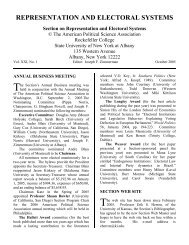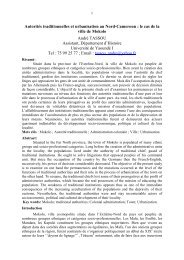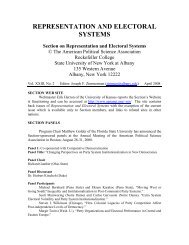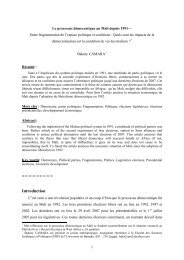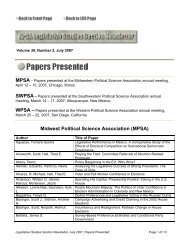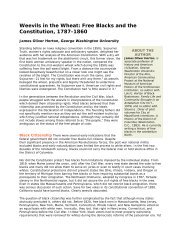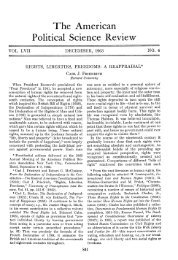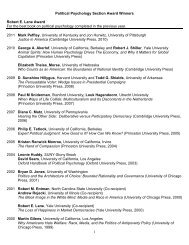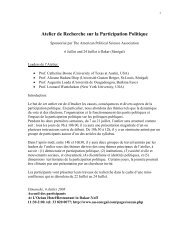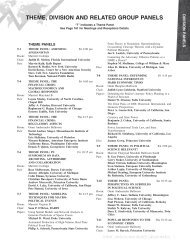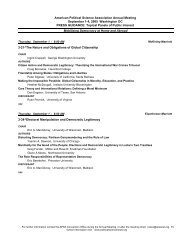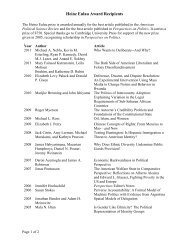representation and electoral systems - American Political Science ...
representation and electoral systems - American Political Science ...
representation and electoral systems - American Political Science ...
Create successful ePaper yourself
Turn your PDF publications into a flip-book with our unique Google optimized e-Paper software.
2<br />
In view of the fact Professor Cox is the only two-time winner of the Hallett<br />
Award, we are publishing the statement of the selection committee read by Professor<br />
Paul Abramson of Michigan State University at the award ceremony in Chicago on<br />
August 31, 2007.<br />
“This is the second time in four years that Gary Cox has won the George H.<br />
Hallett Award, which is presented annually to the author of a book published in the last<br />
ten years that has made a lasting contribution to the literature on <strong>representation</strong> <strong>and</strong><br />
<strong>electoral</strong> <strong>systems</strong>. In 2003, he received the award for The Efficient Secret, his study of<br />
political parties in Victorian Engl<strong>and</strong>, published in 1987. Making Votes Count: Strategic<br />
Coordination in the World’s Electoral Systems, published in 1997, also includes a<br />
fascinating discussion of British politics, although it is much broader in scope. It was the<br />
unanimous choice of this year’s selection committee, Jack Nagel, Michal Shamir, <strong>and</strong><br />
me. Indeed, in the baseball parlance used for selection into the Hall of Fame, Making<br />
Votes Count was selected in its first year of eligibility.<br />
Gary’s book has won many awards already. In 1978, it won the Woodrow Wilson<br />
Award for the best book published in the United States in the previous year on<br />
government, politics, <strong>and</strong> international affairs, the most prestigious award of the<br />
<strong>American</strong> <strong>Political</strong> <strong>Science</strong> Association. It was also named as best book by the <strong>Political</strong><br />
Economy section of APSA, as well as the Comparative Politics section.<br />
As the Woodrow Wilson award statement reads, “Making Votes Count is an<br />
intellectual tour de force combining the best features of traditional comparative studies<br />
<strong>and</strong> contemporary formal analysis.” In addition, reviews of Gary’s book lavished fully<br />
warranted praise. For example, in his review in the APSR, Mel Hinich wrote that “every<br />
serious scholar of political <strong>systems</strong> should read this book. Gary Cox has superbly<br />
organized the theoretical <strong>and</strong> empirical literature to illuminate the complex interactions<br />
between the rules used to select the winners in a political system <strong>and</strong> the behavior of<br />
c<strong>and</strong>idates, parties, <strong>and</strong> voters.” In the <strong>Political</strong> <strong>Science</strong> Quarterly, Olga Shevesova wrote<br />
that “this book is of potential interest for readers in all fields of political science. It<br />
epitomizes the balanced use of formal theory <strong>and</strong> comparative method as an approach to<br />
developing general underst<strong>and</strong>ing of diverse political phenomena. Making Votes Count<br />
will certainly become a required reading in many graduate <strong>and</strong> undergraduate seminars<br />
on comparative political institutions <strong>and</strong> positive political theory.” And, writing in the<br />
Canadian Journal of <strong>Political</strong> <strong>Science</strong>, André Blais wrote, “this is a great book. . . . Cox<br />
powerfully demonstrates the fruitfulness of looking at the impact of <strong>electoral</strong> <strong>systems</strong><br />
from the perspective of formal theory, provided this is combined with solid empirical<br />
analysis.”<br />
Has Gary’s book stood the test of time? If ten years is enough time to test its<br />
endurance, certainly so. Not surprisingly, there have been quibbles raised about some of<br />
its arguments, but it remains the most important book on comparative <strong>electoral</strong> rules ever<br />
written. It is not at all surprising that eight years after Making Votes Count was published<br />
Gary was inducted into the National Academy of <strong>Science</strong>s.<br />
Will his book continue to st<strong>and</strong> the test of time? Naturally, if democracy<br />
continues to spread throughout the world, <strong>and</strong> as relatively new democracies gain<br />
political experience, we can expect changes in election rules. Even long-established<br />
democracies can change their rules. For example, New Zeal<strong>and</strong> changed from first-past-



